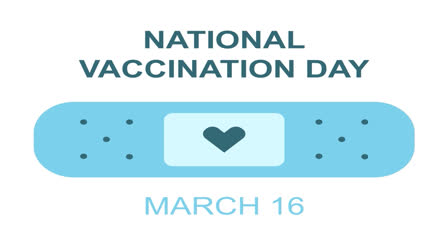Hyderabad: Every year on March 16, the National Vaccination Day is observed to remind ourselves about the importance of getting vaccinated. It marks a special moment in India's history when the first oral polio vaccine was given in 1995. Vaccination is a powerful way to prevent serious diseases and is supported by the World Health Organization (WHO). This day is a time to recognise how vaccines contribute to better public health, longer life, and positive impacts on our communities.
Significance of National Vaccination Day
Saving Lives: This Day is all about celebrating the fact that vaccines save lives. They are necessary for a healthy life and have a significant positive social and economic impact on our communities.
Amazing Human Achievements: The development of vaccinations is regarded as one of the greatest achievements in human history. On National Vaccination Day, we celebrate the advancements in medical research that have significantly improved our health.
National Vaccination Day is significant as it serves as a potent stimulus for illness prevention and public health. This annual observance underscores the critical importance of vaccinations in safeguarding communities against the threat of infectious diseases. It acts as a collective call to action, reminding people that they must protect others and themselves by being vaccinated.
In addition to being a day to be vaccinated, National Vaccination Day is part of a larger campaign to spread knowledge about the advantages of vaccination. We hope to promote a culture of health-conscious decision-making by focusing attention on the importance of this day and making sure that communities and individuals value vaccination as a crucial component of public safety. We can create a robust and vaccinated society by joining together on National Vaccination Day, supporting international efforts to end preventable diseases and improving everyone's health in the future.
History of National Vaccination Day
India gave its first dose of oral polio vaccination to its citizens on 16 March 1995. It was also the day when the country celebrated its very first National Immunization Day. This oral polio vaccination was an integral part of the government’s Pulse Polio Programme, which was planned to eradicate polio from the nation. To achieve this, the plan included vaccinating hundreds of children every day. Years later, the WHO announced India was polio-free on 27 March 2014. Despite achieving the desired results, India, along with some other countries, decided to continue its vaccination campaigns to achieve complete polio eradication.
The Theme of National Vaccination Day 2024
The Theme for National Vaccination Day 2024 is 'Vaccines Work For All'. The theme argues that all human lives, regardless of age, gender, location, or socioeconomic level, must be protected from avoidable diseases by safe and effective immunization.
National Vaccination Day Timeline
- 1796 (First Successful Vaccination): Edward Jenner was able to effectively illustrate how to vaccinate against smallpox using cowpox
- 1885 (Rabies Vaccine Development): The first effective vaccination against rabies was created by Louis Pasteur
- 1955 (Polio Vaccine Invented): Jonas Salk developed the first effective vaccine for Polio
- 1974 (Expansion of Immunization Program): The Expanded Program on Immunization was started by the WHO to guarantee that all children have access to regularly advised immunizations
- 1995 (Hepatitis A Vaccine Approved): The first Hepatitis A vaccination in US history was authorised by the Food and Drug Administration (FDA)
- 2020 (COVID-19 Vaccine Development): During the worldwide pandemic, many COVID-19 vaccinations were created and quickly put into circulation
Importance of Vaccination
Disease Prevention: Immunizations have shown to be among the best strategies for stopping the spread of infectious illnesses. National Vaccination Day serves as a rallying point to reinforce the importance of timely vaccinations for diseases such as Measles, Influenza, Polio, and more.
Public Safety: Getting vaccinated helps to ensure the safety of people around you in addition to protecting you. Herd immunity, which is attained via mass vaccination, is an effective defensive mechanism that protects susceptible groups, such as the elderly and those with weakened immune systems.
Global Impact:In an interconnected world, the impact of vaccinations extends beyond borders. By taking part in National Vaccination Day, you can help the worldwide campaign to end disease and make the world a safer and healthier place for everyone.
